|
Covet Lane
Kingston
01227 830230
http://www.theblackrobinpub.com/
https://whatpub.com/black-robin
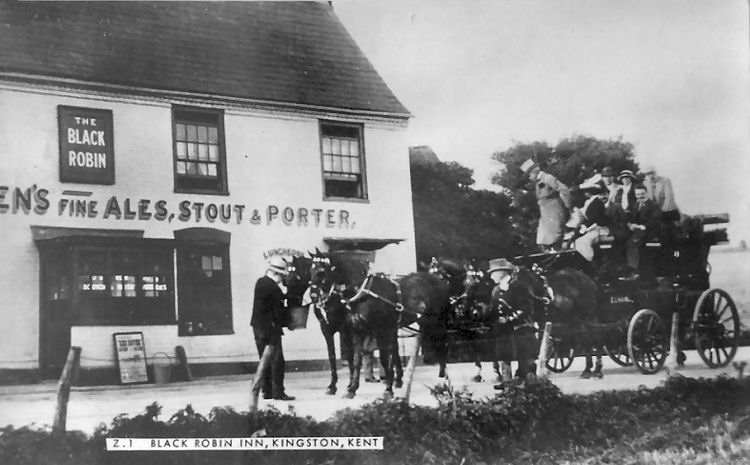
Above postcard, 1890, kindly sent by Rory Kehoe. |
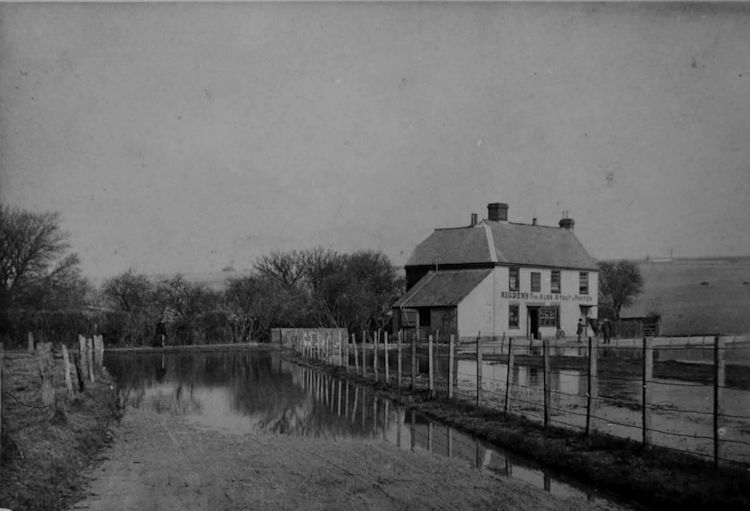
Above photo, 1903. |
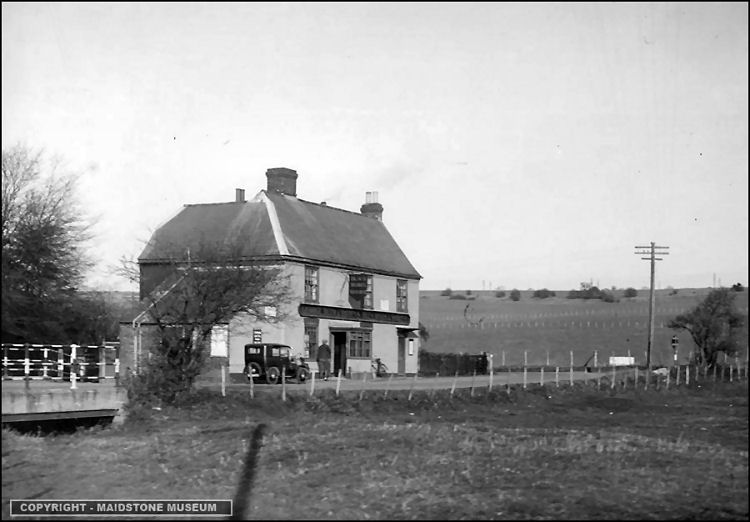
Above photo, date unknown, with permission from Eric Hartland. |
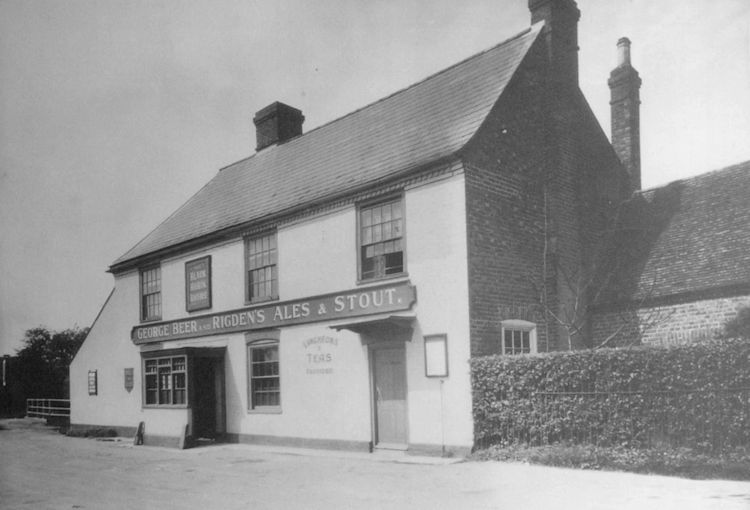
Above photo, circa 1926, kindly sent by Rory Kehoe. Until 1922, the pub
was one of about 125 pubs in East Kent which were tied to W E & J
Rigden's Brewery, Faversham. After Rigden's January 1922 merger with
George Beer's Star Brewery, Canterbury, their combined estate of about
250 tied houses was owned and supplied by George Beer & Rigden's
Brewery, Faversham and the Star Brewery was closed. This photograph is
almost certainly one of the series commissioned by George Beer & Rigden
showcasing all their pubs in their new livery and signage. |
|
From the Folkestone Herald, 14 January, 1928.
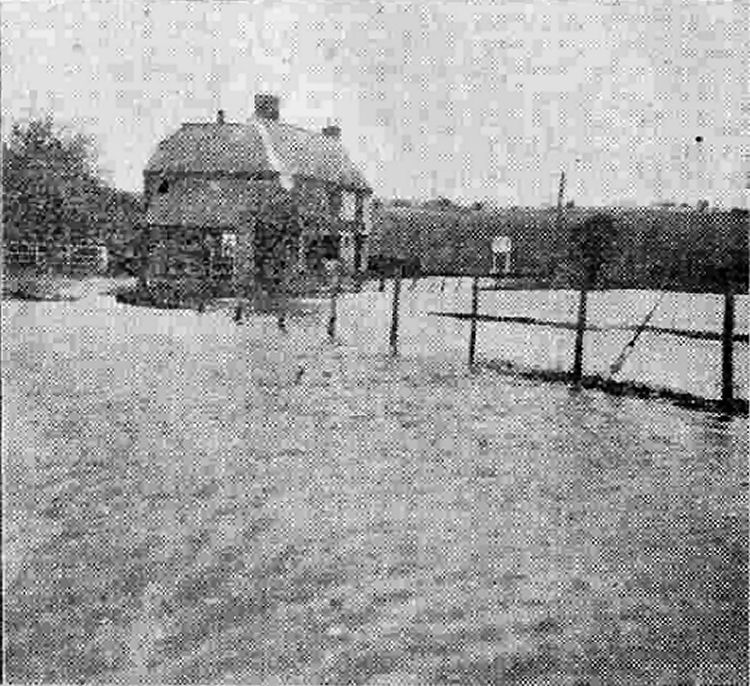
Above photo showing the floods in January 1928. |
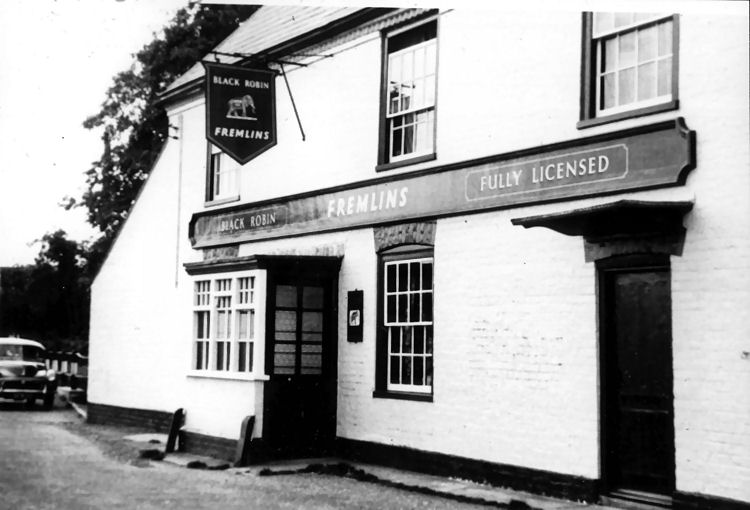
Above photo, August 1960, kindly sent by Clive Bowley. |
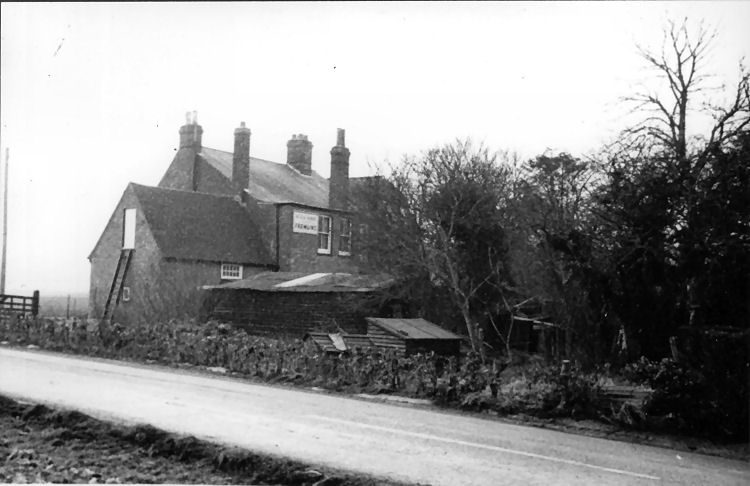
Above photo, August 1960, kindly sent by Clive Bowley. |
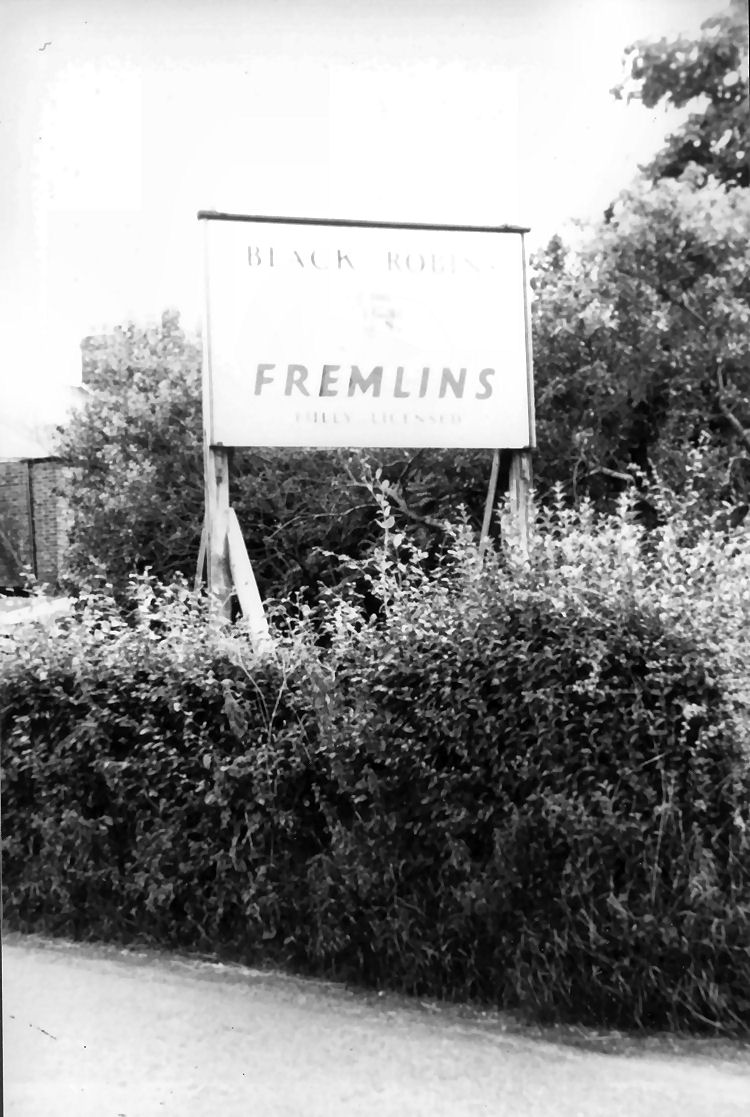
Above sign, August 1960, kindly sent by Clive Bowley. |
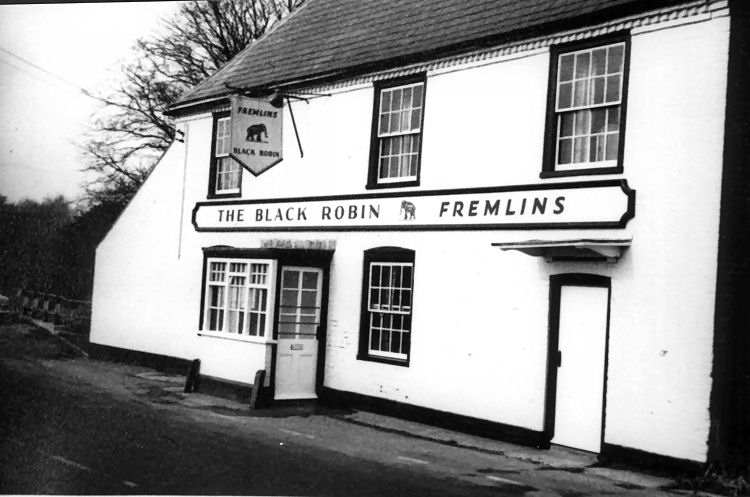
Above photo, March 1960, kindly sent by Clive Bowley. |
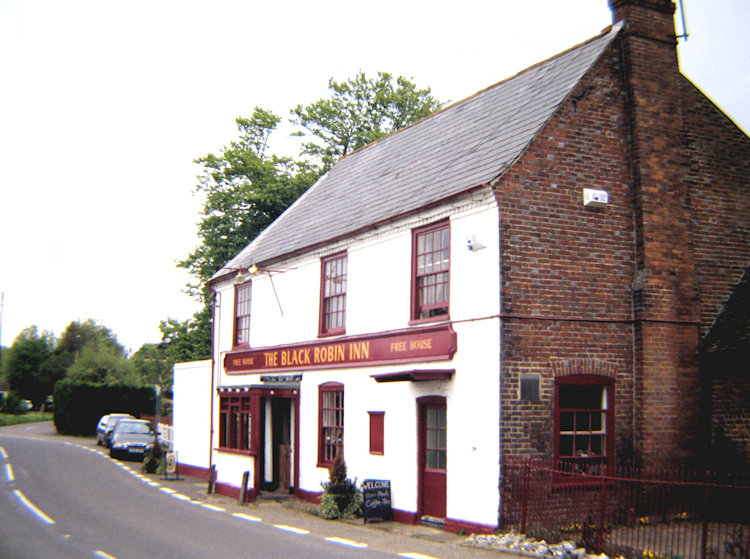
Above photo, 10 May 1992, by Jim Ashby. |
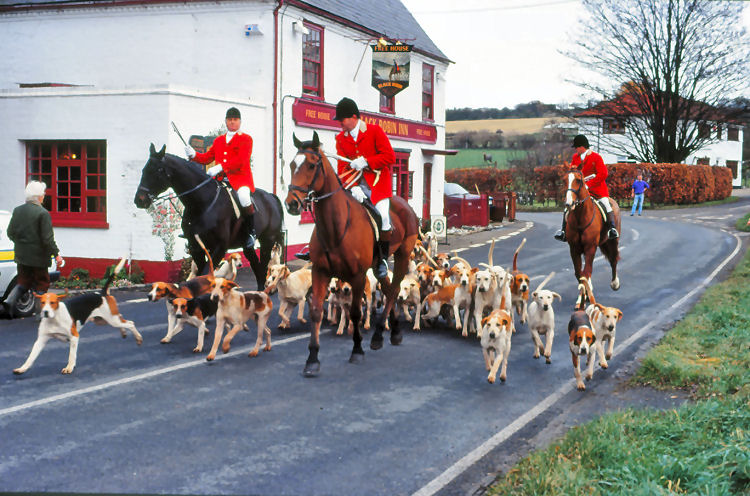
Above photo, November 1992, taken by Gordon Luck and sent by Dougie Moon. |
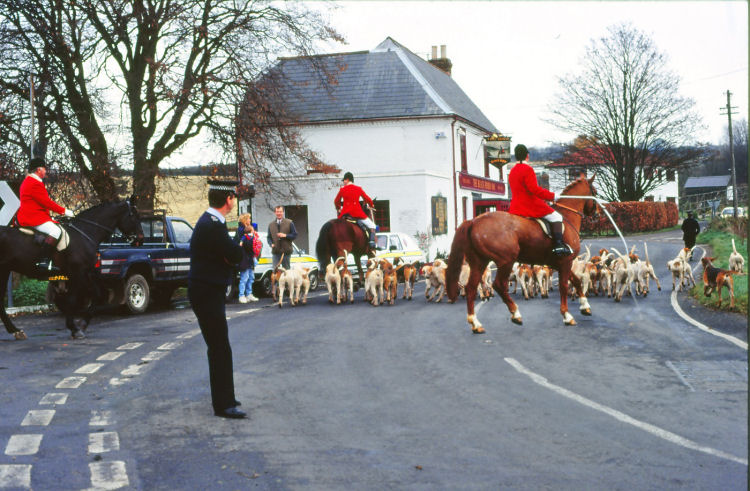
Above photo, November 1992, taken by Gordon Luck and sent by Dougie Moon. |
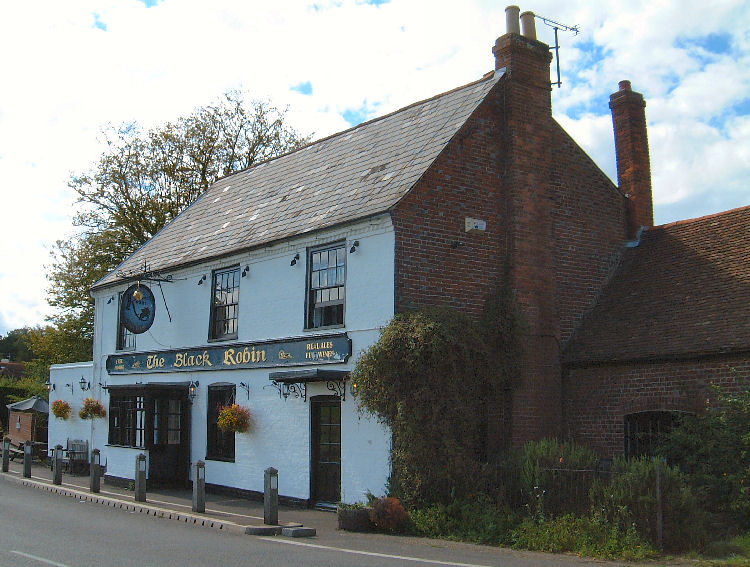 Above
photo taken by Paul Skelton, 22 Aug 2008. |
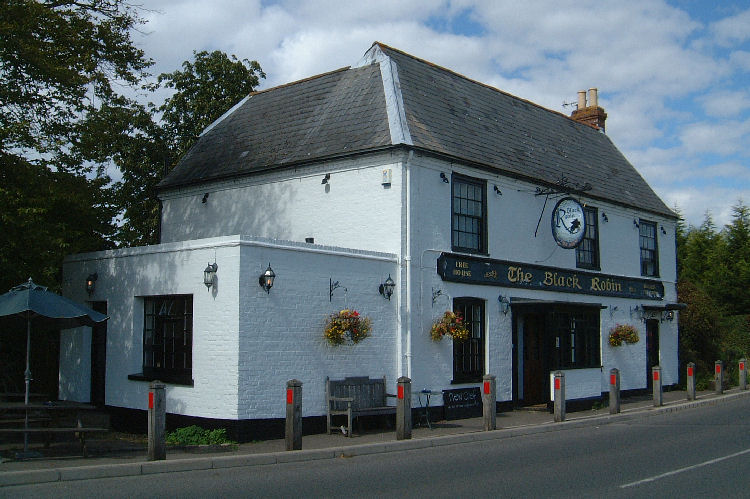 Above
photo taken by Paul Skelton, 22 Aug 2008. |
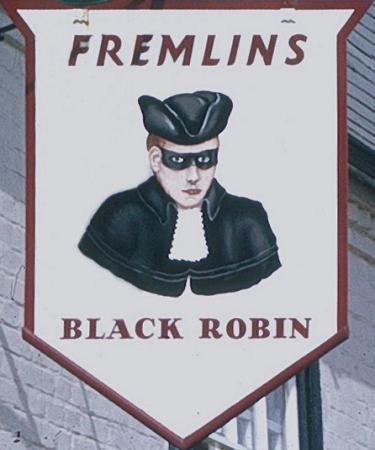 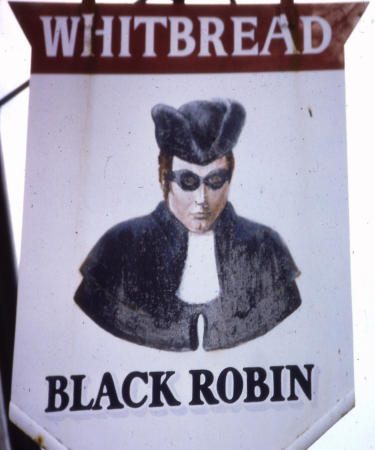
Above sign left 1984, sign right date unknown.
With thanks from Roger Pester
www.innsignsociety.com. |
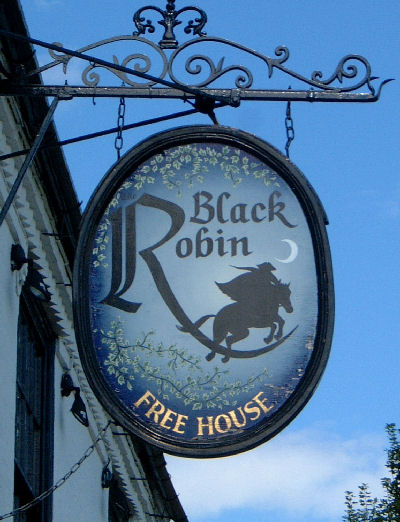 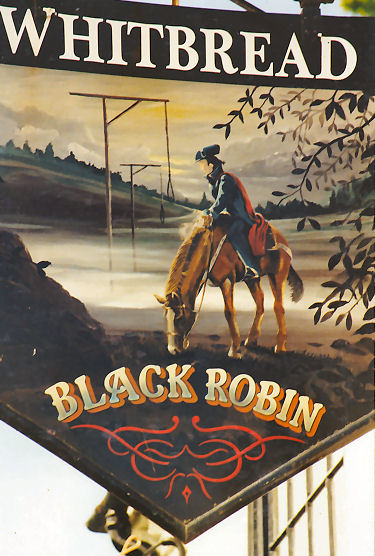 |
|
Above sign left taken by Paul Skelton, 22 Aug 2008.
Black Robin sign right May 1991.
Above with thanks from Brian Curtis
www.innsignsociety.com |
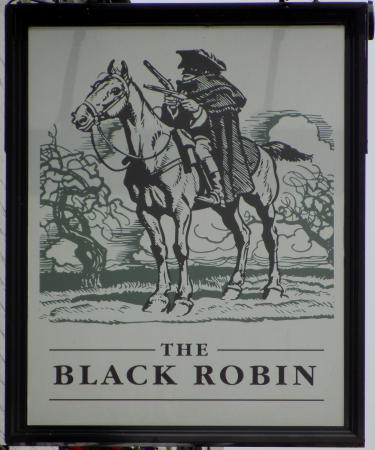 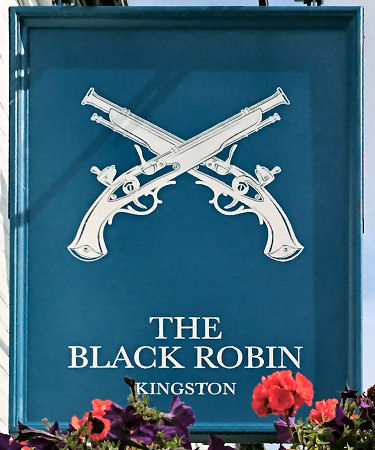
Above sign left 2016 , sign right August 2017, kindly sent by Ray Hopkins
and Roger Pester
www.innsignsociety.com. |
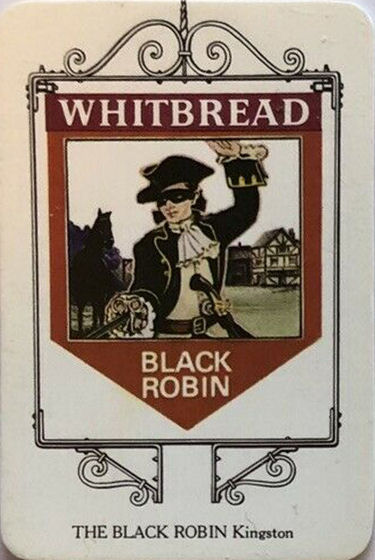
Above Whitbread card, 1973 and series unknown. |
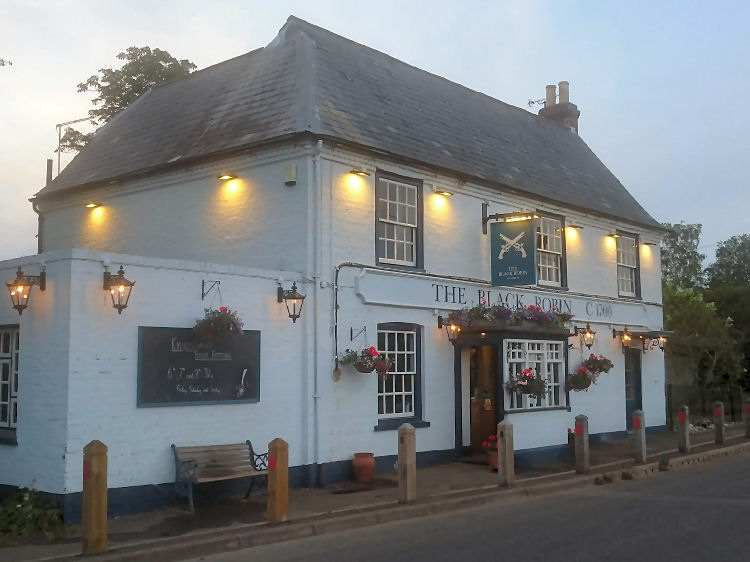
Above photo, June 2018, kindly taken and sent by Rory Kehoe. |
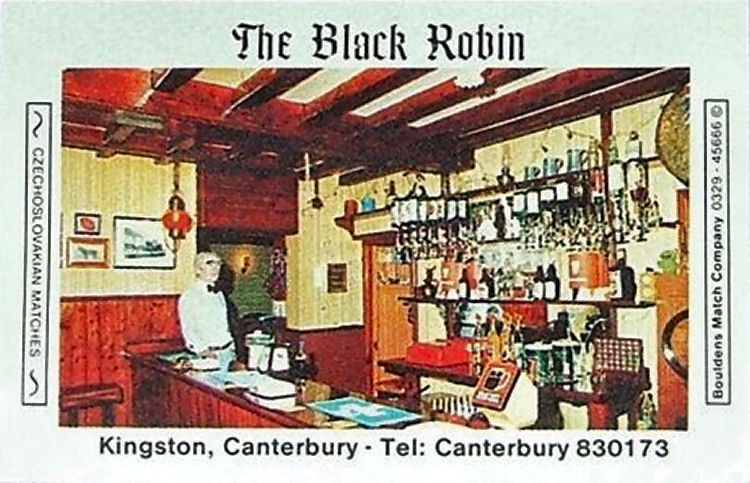 Above
matchbox, circa 1986, kindly sent by Rory Kehoe. |
Reference found so far is in the Wingham Division Ale Licence list,
which shows the "Black Robin," Kingston, to be re-licensed for the sum of 8 shillings in
1740 indicating that the pub was present before 1740.
|
Taken from
http://legendarykent.wix.com
The "Black Robin" Public House stands at the gateway to the village
of Kingston in Kent. Legend has it and many are thought to believe that
it is named after a highwayman. But the term 'Black Robin' actually
comes from the old Kentish slang for 'highwayman'. Basically similar to
the Cockney slang 'Tea Leaf' (Thief). The "Black Robin" pub was used by
smugglers and a network of other smuggling gangs as well as highwaymen.
The most notorious of all being The Aldington Gang who operated from
1820-1826. They used local pubs to drop off their goods where they would
then be sold to people within the community at a price but without the
heavy tax. Goods would be unloaded from the Deal, St. Margaret's Bay
area and down onto the Romney Marshes. The leader at the time was Cephas
Quested who was doing quite well until he and two other gangs were
involved in a battle with Customs men (Preventivemen) at the Battle of
Brookland in February 1821. The battle took place when the gangs were
caught unloading, they still managed to load up their goods while
fighting and scatter across the county. Cephas Quested in the confusion
of battle turned to a man near him, give him a musket and told him to
'Blow the officer's brains out'. Unfortunately for him, he mistook the
man as a collegue and instead turned to Richard Morgan, a midshipman of
the blockade force who promptly turned the gun on Quested. Cephas was
tried at the Old Bailey on April 17th and later hung at Newgate Prison
on 4th July, 1821. George Ransley took over as leader of the gang, he
had excellent organisational abilities. According to legend, George was
a Ploughman/carter. It is also said that one night there was a fight
between gang members, leading to one of their members being murdered in
the "Black Robin." He dragged outside and left on the road. Locals of
the area and passers by have been witness to the sound of groans,
possibly from the murdered gang member but no-one knows for certain.
Many incidents have happened at this junction over the years and the
eerie sounds that can sometimes be heard, could be from any number of
sources. George Ransley and his gang were eventually caught on 4th July,
1826 on the beach at Dover. Ironically five years to the day Quested was
hung. Richard Morgan the midshipman was killed and Ransley was arrested
on suspicion of the murder. If found guilty, the charges carried the
death penalty but their lawyer, a local gentleman from Maidstone, got
the sentences reduced to transportation to Tasmania or Van Dieman's Land
as it was known then by Europeans, because the crime had occurred in the
dark and the actual circumstances were difficult to prove. George proved
an excellent farmer, a good administrator, was granted a conditional
pardon on 22 June 1838. His brother-in-law (Samuel Bailey) was also on
board the same ship (Governor Ready) as was fellow gang members Thomas
Gillham and James Hogben. Ransley was given 500 acres of land and his
wife and ten children were allowed to sail out to join him. He farmed at
River Plenty, Hobart. He died there in 1856. The "Black Robin" is still
there today and has a model of a smuggler / highwayman beside the bar.
|
|
Reports of COUNTRYWIDE ROBBERIES reported in Northampton Mercury 16
October 1802, INCLUDE:-
Friday night some villains entered the public-house at Black-Robin's
Corner, near Barham, and carried off a quantity of provisions, liquors,
etc. They had the audacity to take a cart belonging to a person in the
neighbourhood with which they removed the stolen goods, and got off
undiscovered.
|
|
Kentish Gazette 12 October 1802.
Friday night last some villains entered the public house at Black
Robin's corner near Barham, and carried off a quantity of
provisions, Liquors &c. they had, we hear, the audacity to take a
cart belonging to a person in the neighbourhood, with which they
removed the stolen goods, and got off undiscovered.
|
|
From the Kent Herald, 15 January 1824.
Death.
Jan 11, suddenly, at Kingston, age 84, Mr. Henry Spain, many years landlord of
the "Black Robin."
|
|
From the Kentish Gazette 20 November 1838.
UNDER WOOD. TO BE SOLD BY AUCTION, IN LOTS.
On THURSDAY, the 29th of November, at the "Black Robin,"
Kingston, at Three o’clock, about 25 ACRES of UNDERWOOD, in the
Covet.
Wm. Higgens, Woodreeve, will show the Falls.
And further particulars may be had of Mr. Merton, Tunstall.
|
|
John Bull, Saturday 21 September 1844.
BRITISH ARCHAEOLOGICAL ASSOCIATION.
This important institution terminated on Saturday last, its first annual
meeting, at Canterbury. In our last paper we noticed the proceedings of
the earlier part of the week, and we have now briefly to mention some of
the most interesting subjects which were subsequently brought before the
Society.
Dr. Pettigrew, in his remarks on the barrows discovered on Breach Down
and in Bourne Park, fixed their date to be the fifth or sixth century.
But in respect to one of the skeletons, he stated distinctly that its
age did not exceed half a century; and from the position in which it was
found, gave rise to curious conjecture. It lay only a few inches under
the surface, and to all appearances had never received burial rites. It
was known that a notorious highway robber and murderer, who was still
preserved in memory by the sign of “Black Robin’s Corner,’’ once
selected that part for his unholy deeds; and it was just probable that
this skeleton was the remains of one of his unfortunate victims. The
skeleton was that of a man who had died in the prime of life, and by his
side a spear or knife was found, which probably had been that by which
he had been brought to an un-timely end. A unique spear head was
discovered by the side of a female skeleton, which was very remarkable,
as no such thing had ever before been found with a female. Another
interesting feature of the learned Doctor’s remarks was, that of the
teeth of a number of the skeletons being worn down in consequence of
their having subsisted on vegetable food, or peas, or beans. But the
most remarkable of all was the preservation of hair in all cases where
the parties had not been shaven. It mattered not how old the remains
were, hair was the last thing that perished. He related an instance of a
young lady having beautiful ringlets of hair, who, by twisting them in
her month had a hair ball formed in her, double the size of a walnut;
which, by causing inflammation in the stomach, was followed by death. It
behoved gentlemen also to take care as they were in the habit of biting
their whiskers. (Laughter.)
|
|
From the Kentish Gazette, 31 October 1848.
MANOR OF KINGSTONE. NOTICE IS HEREBY GIVEN,
THAT the Lord of the said Manor has appointed to hold a COURT BARON for
the said Manor on MONDAY the 10th of November next, at Ten o'clock in
the forenoon, at the House commonly called or known by the name or sign
of the "Black Robin," in the parish of Kingston, within the said Manor;
at which time and place all and every of the Tenants within the said
Manor are required to attend, and do their respective suits and
services, according to the customs of the said Manor, and to bring with
them their last quitrent receipts, to enter their estates, and to pay
their respective quitrents and reliefs, otherwise the usual proceedings
will be immediately taken the recovery thereof.
LLEWELYN WYNNE,
Steward of the said Manor.
Lincoln Inn, London,
23rd day of October, 1848.
|
|
Kentish Gazette, 11 April 1854.
Stealing Coke - A Serious Charge.
Edmund File, jun., farmer, stealing five hundred weight of coke, the
property of Ernest Augustus Stephenson, at Kingston, on the 12th
January, 1864.
Mr. Rose prostituted:- Mr. Barrow and Mr. Francis defended the prisoner.
Mr. Rose in opening the case stated that the prisoner was charged with
stealing a quantity of coke. The prosecutor lives at Higham House, in
the parish of Kingston, and the prisoner was a small farmer living in
the adjoining parish of Barham. On the 12th of January last, the
prisoner was employed by the prosecutor to bring him a ton of coke from
the gas-works at Canterbury; he had been so employed previously. It
appeared, that he went with a waggon to the gas works and obtained the
coke, the prosecutor having previously ordered it. When at the gas
works, the prisoner ordered 5 cwt. of coke to be put in sacks, although
there was plenty of room for it loose in the waggon; 15 cwts. were put
loose in the waggon. After that the prisoner went and offered to pay for
the coke to the clerk, but he said it was not necessary as Mr.
Stephenson had ordered it and would therefore pay for it.
He then left with the waggon and arrived at the prosecutor's about five
o’clock in the afternoon, when he proceeded to put the loose coke into
the cellar. While this was going on, the prosecutor was walking about
100 yards from his yard gate, when ha saw something lying under a
tarpaulin; he lifted the tarpaulin up, and found five sacks, exactly the
number which the prisoner received at the gas-house. He put his hand
under the tarpaulin, and felt the sacks, which he believed to be filled
with coke, from the peculiarly crisp feel it possessed. The prosecutor
then went back to his house, and told the prisoner of what he had seen,
to which the prisoner replied, that the sacks contained coals and coke
which he had purchased; and that he had bought 2 cwt. of coke at the
gas-works. The prosecutor expressed his surprise that so small a
quantity was sold by the gas company.
The prisoner answered:— "Men that are at work night and day are glad to
get a shilling, if they can."
Now, what was meant by that statement, he (Mr. Rose) could hardly say,
unless it was that the coke had been sold out of the ordinary way to the
prisoner.
However, whatever was meant by that statement, it was quite clear, that
when the prisoner went to the clerk and offered to pay for Mr.
Stephenson's coke, he did not say anything about the 2 cwt. of coke
alleged to have been bought by him. The prosecutor did not arrive at his
house until after the prisoner had commenced depositing the coke into
the cellar, and was therefore unable to say how much he had put in.
Such were the facts of the case; five sacks of coke were found 50 yards
from the prosecutor's yard gates, exactly the number received at the
gas-works. Then again there was the fact, that there was no necessity
for any portion of the coke being placed in sacks. Besides, the prisoner
had made a statement that he had bought 2 cwt. of coke at the gas-works,
but he would call witnesses to prove that he had done nothing of the
kind. It was not necessary to prove that the whole of the coke seen by
the side of the road was the property of the prosecutor, in order to
convict the prisoner; but on the contrary, if the jury believed any
portion of it belonged to then they would convict the prisoner.
The learned gentleman then called witnesses in support of his
statements, but as their evidence was similar, in every respect
of that given by them before the magistrates, and which was published in
extenso at the time, we only give now the fresh points raised in the
course of cross-examination.
The prosecutor repeated his evidence.
Cross-examined by Mr. Barrow:— Could not say how long it was before the
coke brought by the prisoner that he had observed the quantity of coke
in the cellar. The sacks of coke he saw lying in the road were opposite
his gardener's cottage. There is a fall in the road leading from the
main road to the prosecutor's house. Was not aware that on previous
occasions the prisoner had left a portion of his load at the side of the
main road rather than take it down the fall. Did not look into any of
the sacks, but certainly felt four, and was perfectly prepared to swear
that they contained coke, and not coal. He told witness he had a sack of
coal for Coltham; did not mention any other name, but might have added,
"Coltham, at the Robin." The prisoner did not come to witness and ask to
have the coke in his cellar weighed; but he was aware that he had called
at his home end saw his servant; that was the day after the occurrence.
No application was made to him for that purpose, nor had it been
weighed.
Re-examined:— The distance from the lodge to the turnpike road is about
500 yards, while the sacks of coke were lying about 100 yards from the
lodge.
Edward Dadds stated what occurred at the gas-works when the prisoner
received the coke on the day named.
Cross-examined:— Was discharged from the gas-works shortly after the
occurrence, on suspicion of having sold coke and not accounted for it;
but had since been taken back again. Did not sell the prisoner any coke;
he only received it of him for allowance. Did not receive 3s. of the
prisoner. Believed the prisoner asked witness the price of coke. In the
course of the day witness gave his mates a share of the beer bought with
the allowance money given by the prisoner. On previous occasions the
prisoner had taken coke away in sacks. On the Monday following witness
went over to Coltham, but did not tell him that the prisoner bought
loose coke or a sack of him. Went to prisoner’s home, but did not tell
his wife that witness wanted him to go to Mr. Stephenson's and say he
only paid 1s. to witness for allowance. Had never stated that he had
sold the prisoner 2 cwt. of coke on the day in question.
Re-examined:— On previous occasions the prisoner had left 3 or 4 cwt. of
the ton for Mr. Stephenson until the following day.
It was a common thing to receive allowance from persons whom the men in
the gas-works carried up the coke.
Mr. Stephenson re-called; 4s. was to be paid the prisoner for the
carriage of the coke from Canterbury to the prosecutor's house.
John White and Wm. Eldridge having been examined, Mr. James Sladden
Browne was called and deposed that he was clerk to the Gas Work
Company.— Remembered a person coming on the 12th of Jan. for a ton of
coke for Mr. Stephenson. Produced the counterpart of the check given on
that occasion; none was sold or delivered without the check. Saw File on
that occasion, at the window of witness's office; he came to pay for the
coke for Mr. Stephenson, but as that gentleman had ordered it, he
objected to receive the money, as there was some suspicion against the
accused in connection with Mr. Stephenson's coke on previous occasions.
Saw the waggon pass out of the yard, and thought it was an extraordinary
thing for coke to be placed in sacks when there was plenty of room in
the body of the waggon for it. Mentioned the quantities of coke sold on
the day named in the indictment, and the parties to whom it was sold.
Every morning and night the coke was drawn out of the retorts into the
cellar. No one was authorised to sell coke or take money for it, but
witness.
Cross-examined:— They had had suspicions of coke being taken, but never
realised them. He explained the reason why Dadds had been discharged and
taken on again. The coke was weighed as it was delivered, at least it
was placed in baskets made expressly to contain a half-cwt.
George Fagg, a lad, remembered watching something for he prisoner in the
middle of January. The latter asked him if he would watch three sacks of
coke for him and earn 1d. until his boy came. It was between 5 and 6
o'clock, he sat down on the sacks, and took care of them for about a
quarter of an hour, when the prisoner's boy arrived with the cart, and
the sacks were placed in it. While sitting on one of the sacks, three
pieces of coke fell out.— The sacks were quite full.
Cross-examined:— The three pieces of coke all came out if the same sack.
Thos. E. Quested, constable of Barham, served the prisoner with a
summons to attend before the magistrates about the coke, when the latter
said it was not 5 sacks of coke, but 2 sacks of coke and 3 cwt. of coal.
Mr. Barrow then submitted to the Court that the charge alleged against
the prisoner was not one of larceny, as the asking of the coke did not
embrace a trespass. There must be some act to put an end to the bailment
before a larceny should be committed. In the present case, the allegation
was, that the five sacks contained coke; each sack formed a bulk of
itself, and there were five distinct deliveries. Before, therefore, a
larceny could be committed, of that coke, it was necessary that the
prisoner should have broken the bulk of some one sack. He cited the case
of The Queen v. Porter, 20 Law Journal, p. 101, in support of his
argument, and other cases.
Mr. Fransis followed on the same side, observing that the principle
involved in the objection could not be doubted, seeing that there was a
long list of decisions of the courts in favour of it.
Mr. Rose replied, and the Court refused to allow the objection.
Mr. Barrow then addressed the jury at some length in defence; after
which the following witnesses were examined:—
Wm. Filmer was in the service of Mr. Horn, at the "Red Lion," in January
last. The prisoner borrowed three sacks to put some coal in; the same
day the sacks were filled with coal and left in the stable. On the
following Saturday, the prisoner brought witness's master some fodder in
a waggon; in the afternoon, the prisoner brought three empty sacks into
the stable, when witness filled them with the coals contained in the
other sacks. He heard a waggon go on just after; did not see the waggon.
Evans Cock remembered going with the prisoner to fetch Mr. Stephenson's
coke. Took two ton of fodder in the waggon to the "Red Lion," and some
empty sacks. Then went to the gas-works; after being there a short time
the prisoner came, and witness heard him say he wanted some coke for
himself; he also asked the price. One man said it was 18d. and one 16d.
The last tally he heard call was 32, which basket witness carried up
himself. Did not see any money pass from the prisoner to one of the men.
When the waggon was filled, witness went with it to the "Red Lion," when
the prisoner got on to the waggon and said he had some coal to take.
Witness then went down into the town, and subsequently returned and
caught up to the waggon. Just before reaching Mr. Stephenson's spouse,
the prisoner said he should take his coal and coke out; he did so, and
also hailed the chains and tarpaulin out. It was a bad road all round
the home and not fit to go with a load. After delivering the
prosecutor's coke, they went to the "Black Robin," where one sack was
delivered. Before going to the "Black Robin," the five sacks were put
into the waggon again. Upon caching Covett Lane, three sacks were left
there; witness had one of the sacks of coal, and paid the prisoner again
for it on the next week. Witness took his sack home in his brother's
waggon.
Cross-examined:— Lives with the prisoner's father as waggoner. Did not
tee the coal put on the waggon at the "Red Lion." Witness’s sack was not
much more than half-fall.
Wm. Foreman:- In January last was in the prisoner’s employ; went to Mr.
Cox's farm got a horse and took it to the prisoner’s farm and placed it
in a cart. Then went to Covett Lane and took up three sacks. The witness
Fagg assisted him. Afterwards drove to the prisoner’s house, and
emptied the sacks into the coal-hole:— one of the sacks contained coke,
and the other two coal.
Crosse-examined:. —Two of the sacks were not quite full; the third was.
James Coultham, landlord of the "Black Robin, Kingston:- Remembered the
12th of January, when the prisoner brought him a sack of coke. The
witness Dadds called at his home the following Monday, and asked where
young Mr. File lived, as he wanted to see him about the coke he had for
Mr. Stepheson, for he had got turned away from the gas-works respecting
it.
Witness then said what for?
Dadds replied:- "After Mr. File had the ton of coke for Mr. Stephenson,
he asked for a hundred for himself. I said he could have it, if he paid
allowance. He then asked what he was to fetch: I said—not anything, as
it will cause suspicion with the governor,—but leave the money with us.
He gave me a shilling and I told him to take a sack of coke."
Cross-examined:— Witness is brother-in-law to the prisoner. The
conversation took place outside witness’s door.
A number of persons were called to character, who spoke highly of the
prisoner for honesty and integrity.
Mr. Rose replied on the defence set up, and pointed out its
inconsistencies; after which the Chairman summed up very briefly. It was
quite clear that if the defence set up was true, the prisoner had
obtained 2 cwt of coke of the man Dadds surreptitiously, as the delivery
of the ton of coke was clearly shown by the servants of the Gas Company.
The jury then retired to consider their verdict. After a short absence
they returned into Court, with a verdict of "Not guilty."
|
|
Kentish Gazette. Tuesday 05 August 1856.
HORRID MURDER OF TWO YOUNG FEMALES BETWEEN DOVER AND FOLKESTONE.
A painful degree of excitement was occasioned in these two towns, and
surrounding neighbourhood, on Sunday, by the discovery of the murdered
bodies of two young females named Back, of the respective ages of 17 and
19. It appears that a Neapolitan named Tedea Bedenies, (sic Dedea Redanies) in the 4th
company of the 2nd battalion, 2nd regiment British Swiss Legion, now
stationed at Shorncliffe, had for some time past been paying his
addresses to Caroline Back, aged 19, the daughter of a laundress,
residing in Albion Place, Dover. He paid a visit to the house on
Saturday evening, and while there quarrelled with her, and accused her
of carrying on a correspondence with a sergeant of the same regiment. In
consequence she returned him his portrait which he had given her, and on
taking it he said it was no good. Maria was present during the time. He
returned to the house at three o’clock in the morning, and prevailed on
Caroline to consent to go with him to the camp to spend the day,
accompanied by her sister Maria. They cleaned themselves and left for
that purpose; and were seen passing the "Royal Oak" on the road at about
five in the morning. They were remarked as being particularly clean and
tidy, and one of them wearing lavender boots. Nothing more was seen of
them till past seven o’clock when a man named Curling, who worked on the
South-Eastern Railway, having been to Dover to see a friend off, was
returning, when he sat down on a bank bordering the sea, and took out a
newspaper to read. Seeing something lying on the grass at a short
distance, in a hollow close by the footpath, leading to Folkestone, he
called out, thinking it was a person asleep, and finding no response
went to the spot and discovered one of the murdered bodies. He ran to a
friend whom he had left a little behind, and then they discovered the
second body lifeless, at about twelve paces from the other.
This was about 2 1/2 miles from Folkestone and 3 1/2 from Dover. They
immediately gave information to Superintendent Steer, of the former
place, who with assistance got the bodies removed to the nearest
cottage; and Dr. Bateman, who was called in, pronounced death to have
resulted from the stabs which the deceased had received. The elder
sister had received four stabs near the heart, three of which penetrated
the lungs, and any one of the three was calculated to prove fatal. Her
clothes were also much disordered. The younger girl, Maria, appeared to
have struggled hard with her assailant. Several of her fingers were
severely cut through her gloves, by some sharp knife; and various of the
wounds which she had received in the upper part of her person, were
pronounced to be mortal. The condition of the elder was also such as to
awaken suspicions of the close intimacy that had existed; but whether
any violence had been exercised in this respect, we are at present
unable to state.
The supposed murderer was seen running through the village of
Capel-le-Ferne shortly after the occurrence, wearing a military cap and
a black mantle turned inside out, belonging to one of the females.
Various reports were in circulation as to the places at which he was
afterwards seen, and among them this city, but we could learn nothing
authentic of this. He was traced yesterday to Black Robin’s Corner, near
Barham Downs, and thence to a cottage in Broome Park, where he had some
bread and cheese, for which he gave the woman of the house sixpence, he
afterwards went to the house of a person named Atwood, at Lower Hardres,
where he wrote two letters—then went to the "Horse Shoes" public-house
and had some beer, and posted two letters, one of which was addressed to
Mrs. Caroline Back, the mother of the deceased, and the other to Lieut. Schmid, surgeon of his regiment. There all clue of him was lost,
notwithstanding the vigilance of Superintendents Walker, Stokes, Robins,
and Steer; but the letters were obtained and impounded; and we should
have thought that means would have been obtained for learning their
contents, but neither the post master nor the magistrate to whom they
were taken felt himself justified in opening them; upon which they were
forwarded to their destination, by special messengers, with the view of
learning the contents. The murderer is 25years of age, 5ft. 6in. high,
with black hair, no whiskers and small black moustache.
Mr. Delasaux opened an inquiry on the bodies of the deceased yesterday,
and after taking some evidence to justify a farther inquiry, adjourned
the sitting.
APPREHENSION OF THE MURDERER.
The active steps adopted by the different Superintendents left little
chance of the murderer long escaping detection. It appears that in
consequence of the in formation they disseminated, parties were on the
look out in every direction, and whither also various individuals were
despatched to arrest the fugitive. The last seen of him, according to
the above account, was at Lower Hardres, between twelve and one
yesterday afternoon. Between three and four a man stopped Mr. Lake, of
Milton, and asked him for work, and while doing so, he suddenly pointed
to the approach of the murderer, saying “here comes the fellow.” But how
he came to dive into the subject so readily, we are at a loss to
comprehend, as was Mr. Lake, who had said nothing to him about the
affair; nor did he know who the man was. At that moment, a number of Mr.
Lake’s men were also on the qui vive, they having received intimation of
the horrid crime and the probability of the murderer coming that way. He
had first come in the direction of Howfield and crossed the viaduct, and
suspecting that he was the object of their observation and pursuit, he
stabbed himself three times in the breast before he was reached, and
fell to the ground bathed in blood. The men had felt at first a little
intimidated when they saw him flourishing the knife, and something of a
stiletto form; but seeing what he did they bounced upon him and at once
made him secure. The attendance of Mr. Bond, surgeon, of Chartham, was
procured, but he could not tell whether the wounds would prove mortal.
His apprehensions were that an internal haemorrhage might be going on;
the result of which might easily be conjectured.
Information was speedily conveyed to Canterbury, and Superintendent
Clements went and took charge of the man, brought him to Canterbury, and
conveyed him to the hospital, where he was left in care of a police
constable.
The murderer, and would be suicide, was examined by Mr. Reid, who could
not pronounce the stabs he had given himself fatal, though he was
equally at a loss whether the internal flow of blood might not terminate
in that. It being thought advisable to have the man undisturbed, no
unnecessary questions were put to him; but the attendance of a gentleman
was obtained, as interpreter, and to him the prisoner confessed that he
had done something very dreadful. Everything necessary was done to
revive the prisoner; and at nine o'clock he had much improved, and there
were hopes that his recovery would take place.
The murderer is described as indicating nothing very furious; his height
is little over five feet and a half, slight in stature, small features,
and somewhat sickly in appearance.
When arrested he had with him the black capes belonging to his
unfortunate victims; one of which he carried on his arm, and the other
he wore, evidently to hide his military jacket. This cape had three
perforations on the left breast—whether through stabbing himself, or one
of his unfortunate victims when she wore it, we are unable to state. Had
there been a more efficient parish constabulary his apprehension would
have been effected earlier; for at five o’clock yesterday morning, the
murderer was found asleep at Black Robin’s Corner by two boys, who
roused him. Had there been a vigilant parish constable he would have
been on the alert and soon followed in his track. This like many other
cases shows the importance of having an efficient county constabulary,
with prompt and methodical means of communication. We find no fault with
the superintendents—they did all they could, aided by our own city
police, one of whom (Inspector Spratt) posted as far as Sittingbourne
and had to trudge his way home on foot. This ought not to have been. He
should have been mounted, or at least had a vehicle.
A melancholy gloom has been thrown over the minds of many who knew the
unfortunate deceased, as they were very respectable young women for
their sphere in life and bore a good character.
Further reading
click here.
|
|
Kentish Gazette 09 March 1869.
KINGSTON.
A delightful evening was spent by the country lads and lasses at the
famous old "Black Robin" Inn, on the night of Tuesday week, in
consequence of the worthy landlord (Mr. Coltham), having thrown open
his room for a dance.
The room was beautifully decorated by Miss Coltham.
After a breakfast served up in "mine host's" best style, the party broke
up, all highly delighted with their evenings entertainment.
|
|
From the Canterbury Journal, Kentish Times and Farmers' Gazette, Saturday 3 October 1896.
BARHAM. A PUBLICAN 8EBIOU8LY ASSAULTED BY SOLDIERS.
At the Comity Magistrates' Clerks' office, at Canterbury, on Thursday,
Henry Fullick and Walkin Philips, both of the Army Service Corps, were
charged on remand with assaulting and beating William Henry Rose, on the
16th September.
Fullick pleaded guilty, and Philips not guilty.
Prosecutor, who is the landlord of the "Black Robin," Kingston, deposed
that about half-past nine on the night of the 16th, prisoners and three
other soldiers came to his house and were supplied with beer. He closed
the house at 10 p.m., and told every one to leave. He went to the back
of the house and a few minutes afterwards heard some one knock at the
front door demanding some beer. He called out "Serve no one, it has gone
ten," He went and found the prisoners outside the house, and requested
them to go after their comrades. Philips then threw him down by catching
hold of his legs and Fullick struck him over the head with a belt or
something of that description. He was wounded and covered with blood,
but he got away from them and went indoors. He afterwards went to the
camp and had his wounds dressed. He had since been medically attended.
The prisoners were not drunk. Philips sat on his neck and held him down
while Fullick struck him, he did not think Philips struck him. Replying
to Fullick, witness said he did not strike him.
By Philips:- He went hack to the house and fetched a gun for for self
defence because prisonetrs broke a hurdle and threatened him.
P.C. Luckhurst deposed to apprehending Fullick, who was covered with
blood. On the way to the police station Fullick said it was a wonder
they did not kill the old man. Both the prisoners were the worse for
liquor.
William Hunt, Corporal of the Military Mounted Police, said that on the
night of the 16th September he placed men round the camp to watch for
the two prisoners. Fullick, who was brought to him, was covered with
blood. Later he arrested Philips, and handed him over to the civil
police. Both the prisoners were sober.
Corporal Darock, of the Medical Staff Corps, stated that prosecutor was
brought to him on the night of the 16th September. He had wounds on his
head and bridge of his nose. Witness dressed the wounds and put in some
stitches. The wounds might have been caused by a belt.
Fullick said he would not have struck the landlord if he had not struck
him first. They both fell to the ground, and in the struggle the
landlord bit his hand. The landlord got a gun and said he would shoot
the lot of them if they did not hurry home.
Philips said he heard Fullick cry out "You coward, you are biting me let
me go, and fight like a man."
The Chairman said it was a very cruel thing to strike the landlord as
Fullick did, as it might have led to a more serious result. He would be
sentenced to two months' hard labour, and Phillips to one month's hard
labour.
|
|
Dover Express 07 February 1902.
The first house in Kingston, is the "Black Robin Inn," an ancient house
which for more than two centuries was held in the family of the Pilchers,
a descendant of whom is the host there now. "Black Robin" is rather a
peculiar name—a rara avis. (rare bird) As we never heard of a robin of that colour,
we presume the name of the Inn has been changed from its old title,
"Black Robber" for the sake of respectability at the risk of
incongruity. Years ago the "Black Robber" appeared on the signboard, and
tradition has it that that objectionable individual had a den on the
side of the Downs from which he used to issue forth to terrorise and
gather booty from travellers on that lonely part of the Dover road.
|
|
From Folkestone Hythe Sandgate and Cheriton Herald
Saturday June 26, 1926: (under Rural District News - BARHAM column):
DEATH OF AN OLD LIFEGUARDSMAN.
We regret to announce the death, on Sunday, at the Black Robin Inn,
Kingston, of Mr William Henry ROSE.
Deceased who was seventy-eight years of age was widely respected. He
had been proprietor of the Black Robin Inn, which is known to thousands
of the travelling public, for thirty years. The hostelry has been in
possession of the same family for generations. A man of fine stature,
the late Mr ROSE served for twenty-one years in the 1st Life Guards,
retiring with an
exemplary record. Of a cheery disposition he had a kindly word for all,
and his death removes a well-beloved figure. The funeral took place on Monday in the Churchyard of Kingston, the
Rector (the Rev. R.V.POTTS), officiating. The mourners were:- Mr Alf ROSE (son), Miss ROSE (daughter), Mrs H. ROSE
(daughter-in-law), Mr A. ROSE (nephew), Mr T. CARLISLE, Miss READ, Mr
SETTERFIELD, Mr H. BAKER and many of the villagers. There were floral tributes from:- Alf, Lill, and the girls; Freda, May;
Arthur and Emme; the Rector and Miss POTTS, Sybil and Ethel CORNISH;
Minnie and Girlie; Mrs G. E. Saville YOUNG and Master Saville YOUNG;
Captain and Mrs W. T. STONE; Miss A. HODGES-MARLEY; Mr and Mrs BARRY; Mr
and Mrs CHARLTON; Mr and Mrs CARTER; Major MEAKIN, J.P. and Mrs MEAKIN;
the churchwardens of Kingston; Major and Mrs TATERSALL (Charlton Park);
George SETTERFIELD and family; Tommy and Harry; Mr Alfred PARKER; and
Harry KELLY, and the boys; Mr C. COTHAM (Barham) efficiently carried out
the funeral arrangements. |
|
From the Folkestone, Hythe, Sandgate, and Cheriton Herald, Saturday, 14
August, 1926.
KINGSTON MARRIAGE.
On Saturday a quiet wedding took place at the Parish Church, the
contracting parties being Mr. Thomas Carlisle, of Kingston (late sergt-major
in the Royal Air Force) and Miss Minnie Rose (daughter of the late Mr.
W. H. Rose, of the "Black Robin Inn.") The Rector (the Rev. R. U. Potts)
officiated. The bride, who was given away by her brother (Mr. Alfred
Rose), was attired in a grey silk dress with a deep lace fringe of the
same colour. Mr Herbert Baker, of Kingston, was best man. After the
ceremony a reception was held at the home of the bride, a large number
of guests being present. Several useful presents were received.
|
|
From the Folkestone, Hythe, Sandgate and Cheriton Herald, Saturday 22 January 1927.
Wedding.
At the parish church of St. Giles, the Rector (the Rev. R. U. Potts)
officiating, Mr. Herbert Baker formerly a police officer at Barham was
married to Miss Frances Rose, who had been brought up from childhood by
her grandfather, the late and much respected proprietor of the
well-known wayside inn, the "Black Robin." After the ceremony and
reception was held at the "Black Robin," the home of Mrs. Carlisle, the
bride's aunt. A number of valuable presents were received. Later in the
day the happy pair left for Cranbrook, where the bridegroom is now
stationed.
|
|
Dover Express, Friday 10 August 1928.
Motor Fatality at Barham.
Car Turns a Double Somersault.
On Tuesday afternoon, a terrible motor accident took place at the
"Black Robin" turning at Kingston. A car, which contains 7 people,
in turning the corner, overturned, and after turning a double
somersault, fell into a field. One little boy, age 8 years, named
Wood, was killed, and others of the occupants seriously injured.
Both the little boy who was killed and his brother, who was badly
injured, live at 4, Albany flats, Dover, with their mother, but had
been away for some time with their mother, who was fruitpicking. The
father lives in London.
The Deputy Coroner for East Kent, Mr. A. K. Mowll, held the inquest
at the "Black Robin Inn," Kingston, on Thursday morning. The foreman
of the jury was Captain William Thomas Stone.
Leonard Wood, of 27, Military Road, Canterbury clothing outfitter's
assistant, identified the body as that of his son, Leonard Oliver
Rowland Wood. Before the accident the deceased had been living with
his mother at Milestone Farm, Patrixbourne. He was 8 years of age.
He, witness, came down from London to Canterbury to spend the
weekend with his wife. His two sons, the deceased and his younger
brother, had been staying with their grandmother, Mrs. Williams, and
they went back to Patrixbourne on Monday evening. On Tuesday they
were in Canterbury. As they had 20-minutes to wait for the 1 o'clock
'bus they went into the "Coach and Horses," Saint George's Street,
Canterbury. They they met Mr. Ernest George Smith, who was in
company with an old friend, Mr. Franks Stent. Mr. Stent suggested
driving them back as far as the "Gate Inn" at the junction of the
old New Dover Road, about 200 or 300 yards from where they were
staying. He knew that Mr. Smith was the owner and driver of the car,
a 1924 Morris-Cowley. He was not sure whether the hood was up or not
when they left St. George's Picture Theatre. Mr. Smith was driving
and his brother-in-law was next to him. Witness and his wife and a
Mr. Hewitt were in the back seats. Then went on to the "Gate Inn."
He arrange with his wife to go to the hut to get some tea for the
party. He had a drink at the "Gate" and thought the others did as
well. When they left the "Gate" at about 2:30 p.m. they agree to go
to Bridge in the car. They went to the "Red Lion," where they had
some tea. They then decided to go to the "Black Robin," Kingston, for
tea. He sat behind the driver and he thought Mr. Smith's brother was
next to the driver and Mr. Stent sat next to Mr. Smith. The two boys
were standing on the floor of the car between witness's legs and
there were five adults and two boys in the four seater car. They
turned into the road known as "Bonnie Bush Hill," which led from the
Dover Road to Kingston on the way to the Elham Valley Road. The boys
were very excited. They were not going fast. They approach the
corner, and as they were taking the bend the driver seemed to lose
himself momentarily, but he did not think the driver could have
averted the accident. He thought, however, that he had lost his
head. He blamed himself for allowing the boys to go in the car. The
driver suddenly jammed on the brakes, the car slewed round on the
road and turned over two or three times. It turned over in the field
and appeared to have turned a double somersault. Everybody was
thrown out. Witness saw that is eldest son was dead, and the
youngest son, Mr. Smith's brother and Mr. Stent were taken to the
Canterbury hospital. They all went there, but the body was left in
charge of the police. He was practically certain that the hood was
down at the time.
Percy Hewitt, 39, Kimberley Road, Upper Edmonton, London said he was
a musical instrument maker and brother-in-law to the Smiths. They
had had some drinks, but will quite sober. His brother-in-law was a
cinematograph operator. He had been driving a car for about 4 or 5
years and he believed he had a clean licence. They only had tea at
the "Red Lion." When they left there Mr. Arthur Smith was sitting in
front with the driver. He thought Mr. Wood sat next to witness and
Mr. Stent next to him. The boys were standing up between Mr. Wood's
legs. He did not know the rate they were going, but he thought they
were doing about 15 miles an hour. At the time of the accident it
felt as though the driver was putting the brakes on as they got to
the corner. He did not think the driver got any response from the
steering wheel and the next witness remembered was standing up in
the field. He did not think the driver was going too fast and about
half a dozen cars passed them after they left Bridge. He did not
think the driver could have done anything to avoid the accident.
Ernest Mummery, of Pudbrook House, Kingston, a farm labourer, said
he was in a meadow about 200 yards from the scene of the accident.
He did not see the car going round the road, but he heard a bang and
saw the car in the air. It seems to twist in the air and fall right
over. He thought that the driver did not know the corner which was a
very dangerous one. He had seen an accident at the same spot before,
and a fatal accident had also occurred there. He sent for Dr.
Wilson. He thought the driver was quite sober.
P.C. G. H. Castle, K.C.C., stationed at Barham, said when he arrived
he found the hood of the car down. The driver was sober. From his
enquiries he found that the party left the "Gate Inn" at 3 p.m. and
the "Red Lion" at 4:10. The accident occurred about 4:55. The foot
brake was in good order, and it appeared that the front brake had
been applied. An R.A.C. man examined the car which was in first
gear.
Dr. J. McLaren, M.D., said he examined the body and found a
lacerated scalp wound and a fracture of the base of the skull. He
also found other abrasions. In his opinion the deceased died from a
fracture of the skull.
The Jury returned a verdict of "Death from Misadventure."
|
|
Dover Express, Friday 23 March 1934.
THE EAST KENT FOXHOUNDS will meet at 11.30 a.m. on Friday. March
23rd, at Acryse Schools. Monday, March 26th, at the "Black Robin,"
Kingston.
Thursday, March 29th, at the "Gate Inn," West Wood.
Thursday, April 5th, at Penny Pot, Denge.
On Monday, April 2nd (Easter Monday), the Hunt point-to-point races
will be held at Brabourne, commencing at 1.30 p.m.
THE WEST STREET HUNT will meet at 12 noon each day on Tuesday. March
27th, at Stodmarsh, Thursday, March 29th, at the "Horse and Hound,"
(sic)
Herne.
Tuesday, April 3rd at the Dower House, Knowlton.
To finish the Season.
The West Street Hunt point-to-point races will be held at Whitfield
on Saturday, 24th March; first race at 1.50 p.m.
Notices.
April 2nd.—East Kent Hunt point-to-point races at Brabourne; first
race, 1.30 p.m.
West Street Hunt Damage Fund dance at the "Lord Warden Hotel,"
Dover, at 10 p.m. Tickets from Mrs. Monins, Ringwould House, near
Dover.
|
|
From the Kentish Gazette, 15 February, 2001.
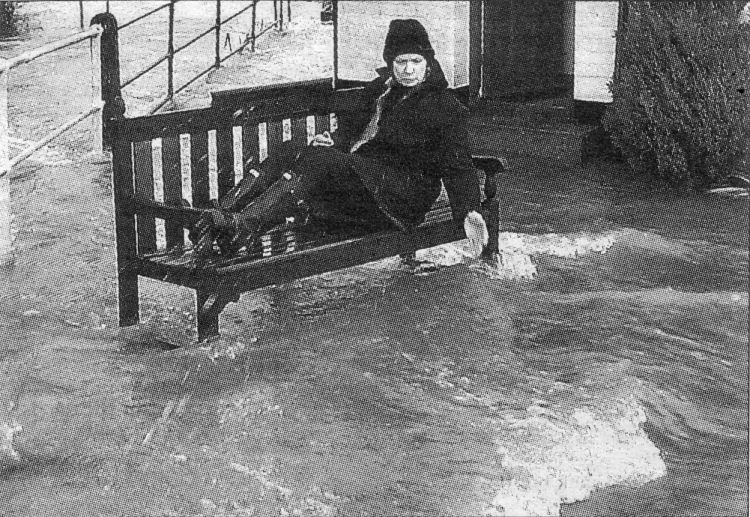
Licensee Jill White (above) takes refuge from the white-water rapids
of the Nailbourne as it races past her "Black Robin" pub at Kingston.
Ms. White, who has just lost a planning battle to close the pub, was
optimistically showing a "business as usual" sign.
Her pub has been marooned in flood water since November, but the
latest deluge was the worst.
|
|
From the Dover Express, Thursday 8 May, 2008. (Advertising)
The ideal job for a food lover.
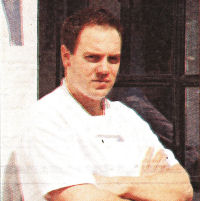
Nick Holt, 33, from Canterbury, has recently become the new head chef at
the Black Robin, Kingston, near Canterbury.
Job description:
I am very much a hands-on chef and start the day dealing with any
paperwork. I will then compile the menus, check the food requirements
and order what is needed.
I usually change the menu every couple of
days so there is always plenty of variety for our customers.
Most of the
food is provided by local farms as the owner of the Black Robin is a
farmer. All the food is fresh and we primarily use seasonal fruit and
vegetables so some of the menu choices are governed by the time of year.
Everything is cooked to order and I will do virtually all the preparing
and cooking, although I have an assistant.
Some days are busier than
others. For instance, it can get a bit hectic if we are having a large
function. We can do buffets for around 50 and up to 100 for a stand-up
reception.
How many hours a week do you work?
I work five-and-a-half days a week on
a split shift system, from 9.30am to 3pm and 5.30pm to 10pm, so it's
about 55.
What qualifications and experience do you need?
I've been in catering
since I was 17. I went to Thanet College for three years to study as a
chef, but originally started on a work placement at "Wallet's Court", St
Margaret at Cliffe, when I was growing up in Dover. I achieved the City
& Guilds qualifications 7061 and 7062, as well as an advanced cookery diploma and a
711 patisserie certificate. Since qualifying I have worked in Ireland
and Oxford but wanted to come back to my roots.
How much could a newly-qualified chef expect to earn?
It would probably
be between £14,000 and £17,000, depending on who he or she was working
for and where.
What made you pursue this career?
I've always wanted to cook. I expect
it's my mother's fault - every time it rained I had to stay home and
make gingerbread!
What personal skills are important?
You must love food and be able to
work as a leader and as part of a team and be a stickler for hygiene in
your kitchen. You need to be fit as the hours are long and you spend a
great deal of time working in a hot kitchen. It is also important to
have a creative and artistic talent because food presentation is
essential.
Best and worst things about the job?
It is fun trying out new dishes and
having satisfied customers who come back time and again. And it's good
when there's someone else to do the washing up! Sometimes the unsocial
hours can affect my private life.
|
|
From http://www.ghostpubs.com accessed 17 June 2015.
HAUNTED.
The inn people called after a highwayman who terrorised this area
until he was caught and hanged. A life size effigy of "Black Robin"
stands in the lounge bar of the inn. Apart from the pub being haunted by
the ghost of that outlaw, it is also home to the ghost of the daughter
of a former proprietor. She had been attacked nearby and seriously
injured by a man who escaped. Folks took the woman back to the "Black
Robin." She died shortly afterwards from her injuries. The ghost of this
woman, witnesses have seen, on many occasions and she is always sobbing.
|
|
From an email received 20 April 2016. I found your website while
researching my family history its been very helpful filling in some
gaps.
I can tell you that the "Black Robin" was originally built by the
Pilcher family and that all of the landlords until at least 1933 are
related by marriage.
The Plicher and the Browings are related by marriage and Thomas
Browing married into the File family and Edmund File is his son in law I
believe.
Edmund File is the maternal great grandfather of William Henry Rose
and James Coltham is also William's uncle with Thomas Carlise being
William's son in law by marriage to his daughter Minnie Rose.
Regards
Ian Rose (great great grandson of William Henry Rose.)
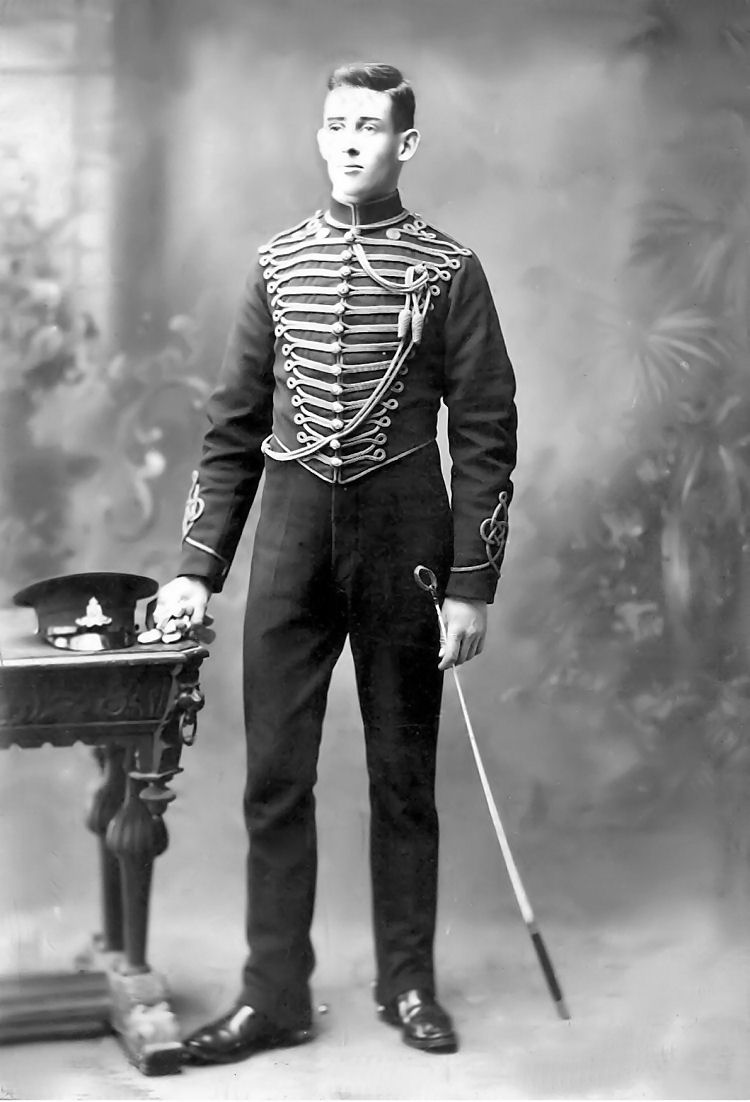
Above photo showing William Henry Rose in his guards uniform. Taken
about 1869, his year of enrolment in the army, before he became
licensee.
|
LICENSEE LIST
BROWNING Thomas 1740+

SPAIN Henry died 11/Jan/1824
FILE Edward 1841-51+ (also farmer age
61 in 1851 ) )

COLTHAM James 1854-74+ (also farmer age 58 in 1871 ) )

COLTHAM Mary 1881-95+ (widow age 72 in 1891 ) )
ROSE William Henry 1896-Sept/1926 dec'd (age 62 in 1911 ) )
  
CARLISLE Thomas Outram Crewe Sept/1926-Sept/1931

 COLE Raymond Sept/1931-Mar/33
COLE Raymond Sept/1931-Mar/33

FILES Mr Lewis Sydney Mar/1933-Jul/41
 
TAYLOR Edward Bertram Jul/1941-61+

WHITE Jill 2001+
SAUNDERS-FINCH Dean ????
https://pubwiki.co.uk/BlackRobin.shtml
 From Wingham Division Ale Licences 1740 Ref: KAO - QRLV 3/1 From Wingham Division Ale Licences 1740 Ref: KAO - QRLV 3/1
 From
Bagshaw Directory 1847 From
Bagshaw Directory 1847
 From Melville's Directory 1858 From Melville's Directory 1858
 From
the Kelly's Directory 1899 From
the Kelly's Directory 1899
 From the Kelly's Directory 1903 From the Kelly's Directory 1903
 From the Post Office Directory 1913 From the Post Office Directory 1913
 From
the Kelly's Directory 1934 From
the Kelly's Directory 1934
 From the Dover Express From the Dover Express
 Census Census
|
























